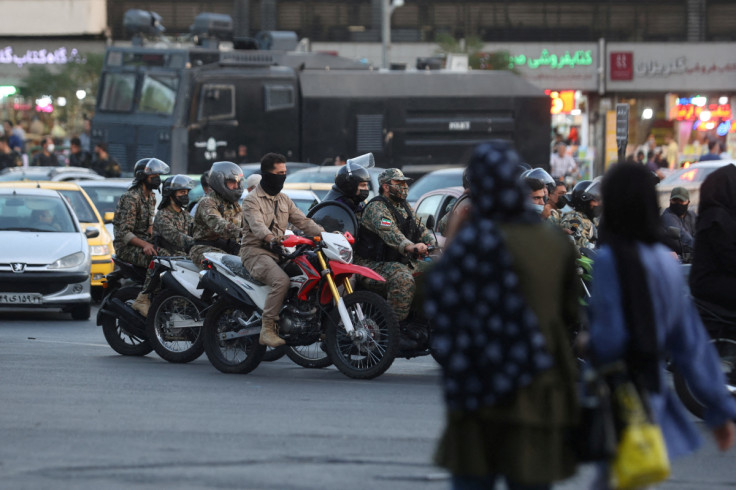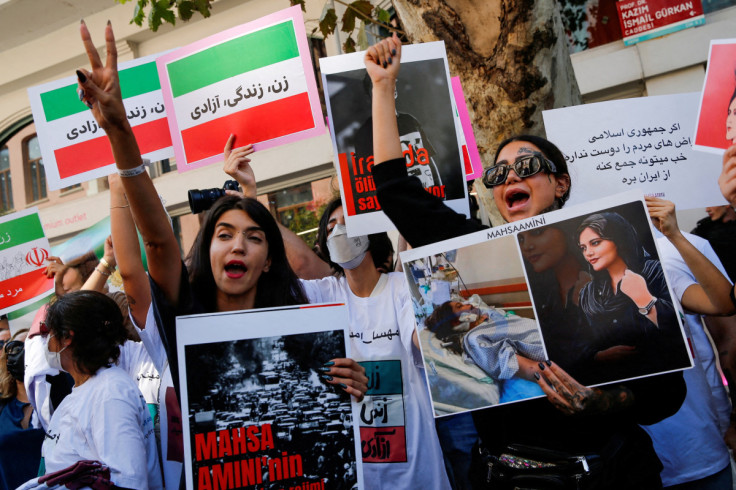Iranian Police Deploy As Unrest Continues Four Weeks After Mahsa Amini Death

Iranian police deployed heavily on Friday in a predominantly ethnic Arab city after activists called for protests, a witness said, as unrest showed no sign of abating four weeks since Mahsa Amini's death in custody ignited nationwide demonstrations.
With Iranians from all walks of life venting anger at their clerical rulers, the protests mark one of the boldest challenges to the Islamic Republic since the 1979 revolution, even if the unrest does not seem close to toppling the system.
Supreme Leader Ayatollah Khamenei, in remarks on Friday, warned of "divisions in the ranks of Muslims" without explicitly mentioning the protests. Earlier this week, he dismissed them as "scattered riots" planned by Iran's enemies.
Some of the deadliest unrest has been in areas home to ethnic minorities with long-standing grievances against the state, including Kurds in the northwest and Baluchis in the southeast.
Human rights groups say more than 200 people have been killed in the crackdown nationwide, including teenage girls whose deaths have become a rallying cry for more demonstrations demanding the downfall of the Islamic Republic.
Amini, an Iranian Kurd, died on Sept. 16 after being arrested in Tehran for "inappropriate attire".
After activists called for protests in the predominantly Arab, oil-rich province of Khuzestan at the Iraqi border on Friday, police deployed heavily in the city of Dezful, a witness said.
There was also a heavy deployment of police and the Basij - a volunteer militia leading the crackdown - in the main squares of Zahedan, the capital of Sistan-Baluchistan province at the border with Pakistan in the southeast, two witnesses said.
Seeking to underline national unity, a group of protesters in the city, which has a large Baluchi population, were chanting in support of demonstrators in Iranian Kurdistan. "Kurdistan - light of our eyes," they shouted, one of the witnesses said.
Iran has blamed the violence on enemies at home and abroad, including armed separatists and Western powers, accusing them of conspiring against the Islamic Republic and denying security forces have killed protesters. State TV reported at least 26 members of the security forces have been killed.
GUARDS OFFICER, MILITIAMAN KILLED
Zahedan was the scene of one of the deadliest days yet on Sept. 30 when Amnesty International has said security forces killed at least 66 people in a crackdown after prayers.
The authorities said Baluchi militants attacked a police station that day, triggering a shootout. The Revolutionary Guards said five members of its forces and the volunteer Basij militia were killed.
Iran, with a population of 87 million, is home to seven ethnic minorities alongside majority Persians. Rights groups say minorities, including Kurds and Arabs, have long faced discrimination. Iran denies this.
A revolutionary Guards major and a Basij militiaman were shot dead by "rioters" early on Friday in southern Fars province, state TV reported. A news agency said the two were
shot after confronting "two rioters" writing graffiti.
Security forces have also pressed their crackdown this week in Kurdish regions where the Revolutionary Guards have a track record of putting down dissent.
Iran's Kurds are part of an ethnic minority spread between several regional states whose autonomy aspirations have also led to conflicts with authorities in Iraq, Syria and Turkey.
Along the Iranian-Iraqi border in southwest Iran is a population of some three million ethnic Arabs, predominantly Shi'ite. Some groups, emboldened by Iraqi Arabs across the border, have pressed for greater autonomy in recent years.
While many officials have struck an uncompromising tone, a top adviser to Khamenei was cited this week as questioning whether police should be enforcing headscarf-wearing - rare criticism of state efforts to impose the hijab.
Amini's death and the crackdown have drawn condemnation from the United States and other Western powers, prompting new sanctions on Iranian officials and adding to tensions at a time when talks to revive the 2015 nuclear deal are at a standstill.
New European Union sanctions on some 15 Iranians were expected to be approved on Monday, diplomats said. Asset freezes and travel bans will have little concrete impact on the individuals, but diplomats said it sent a political message and showed growing international concern about the crackdown.

© Copyright Thomson Reuters 2024. All rights reserved.



















